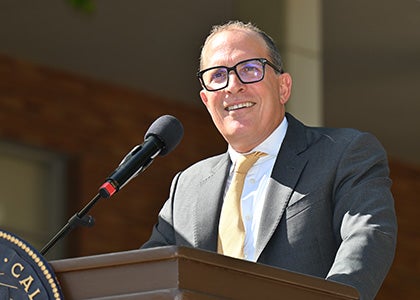
At UCLA School of Law’s annual convocation ceremony on Aug. 22, the year kicked off with a warm welcome for incoming students, who gathered under breezy tents that shaded them from the intense heat of the late-summer sun.
 51. LUVALLE COMMONS
51. LUVALLE COMMONS
Open for business since 1985, LuValle Commons, a student center adjacent to the law school, was named in honor of James “Jimmy” LuValle, a UCLA graduate and Olympic medalist, and the first president of the Associated Graduate Students.
Celebrating 75 Years of UCLA Law
Join the dean of UCLA School of Law, Michael Waterstone, UCLA Chancellor Julio Frenk, and distinguished faculty, students, and alumni as we celebrate 75 years of UCLA Law. This video tribute honors our history of legal innovation and vision for shaping tomorrow's legal landscape. From groundbreaking scholarship to producing leaders who have transformed the practice of law, UCLA Law continues its tradition of excellence while looking boldly toward the future.
 26. VISITS FROM SUPREME COURT JUSTICES
26. VISITS FROM SUPREME COURT JUSTICES
Throughout the years, 11 Supreme Court justices have visited UCLA Law. In 2018, Justice Elena Kagan spoke to then-Dean Jennifer Mnookin about civility and the virtue of listening.
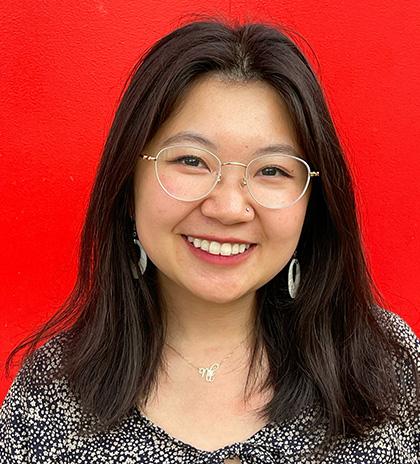
An innovative new partnership between UCLA School of Law’s Criminal Law and Policy Consortium (CLPC) and the Los Angeles County Public Defender’s Office (LACPD) will give individuals facing deportation legal representation from a UCLA Law graduate with deep experience in immigration or public interest law.

The guide is an invaluable resource for advocates who represent unhoused people facing steep financial and legal burdens for sleeping on streets and other basic human behaviors.
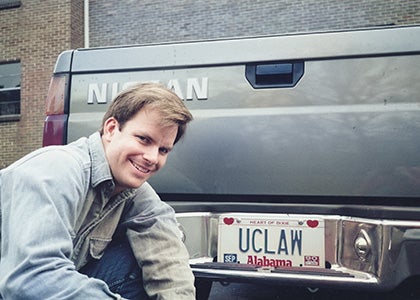 01. ALUMS WHO SHOW THEIR PRIDE
01. ALUMS WHO SHOW THEIR PRIDE
“I believe this photo shows that UCLA alums are establishing beachheads everywhere in the U.S.”
Greg Smith ’89 proudly displays his personalized Alabama license plate.
Please find the readings for our MCLE accredited events below. Materials will remain on this site for 30 days after the event date.
-
2025-26 Readings
The Risk of Federal Interference in the 2026 Midterm Elections
September 16, 2025
Trump is already using election fraud lie to sway midterms - USA Today
Would You Trust This Man With Your Elections? - NYT Op-Ed
Lessons from the 2024 Elections for 2026 and Beyond: A Conversation with Nate Persily
October 7, 2025
Nate Persily Analyzes how America's Electoral System Can Weather the 2024 Elections
Would You Trust This Man With Your Elections? - NYT Op-Ed
Redistricting and Re-Redistricting Controversies and the 2026 Elections
October 16, 2025
More states are moving to redraw US House districts after Trump urged it for partisan gain
Mid-Decade Congressional Redistricting: Key Issues, Congressional Research Service
Media, Social Media, and the Changing Election Information Environment in 2026
October 30, 2025
The Supreme Court, the Voting Rights Act, and the 2026 Elections
November 18, 2025
A Reprieve for Democracy: Reading Milligan on the 60th Anniversary of the Voting Rights Act
How the LL.M. and M.L.S. programs meet the needs of a global society and help UCLA shape the future of legal education
“The country needs people in leadership roles who understand how the law works, and not all of them need to have a three-year J.D. and a license to represent clients.”
Transforming legal education

Offering expansive opportunities for students from all backgrounds, UCLA Law has been moving legal education forward since the day it opened in 1949. Little more than 20 years later, the law school launched its robust clinical education program. And more recent decades have seen a shift further toward the future, with an emphasis on degrees and specializations that expand the reach of a UCLA Law education and diploma.
Today, professionals like Ip who want to learn the law and earn a UCLA Law degree without ultimately practicing law can join the M.L.S. program. At the same time, hundreds of lawyers come from around the world to pursue master of law (LL.M.) degrees, educating themselves in American law or specializing in an array of key areas of practice. These cohorts now make up a vital portion of the students who attend UCLA Law each year— and of the alumni who are able to impact their communities in transformative ways.
Russell Korobkin, the Richard C. Maxwell Distinguished Professor of Law and vice dean for graduate and professional education, was one of the visionary administrators behind this remarkable development. Expanding the menu of what a law school offers was at the top of his mind when he conceived of and launched the M.L.S. program in 2019.
“In the United States, law has traditionally been offered only as a graduate degree, which means that very few people in the business, nonprofit, and government sectors of the economy who are not credentialed lawyers have had any opportunity to study law,” he said. “In a world in which law affects virtually every corner of the economy, this is a really bad situation. The country needs people in leadership roles who understand how the law works, and not all of them need to have a three-year J.D. and a license to represent clients.”
People who earn LL.M. degrees also enjoy the opportunity to distinguish themselves in their careers. The program has been around for years, but it has grown rapidly in size and stature over the past two decades. It is designed for practicing lawyers who have already earned their law degrees, many of whom come from outside the United States to gain expertise in specialties that aren’t readily available in other countries.
“In a lot of countries, law schools provide legal training for private law practice,” said Lara Stemple, assistant dean for graduate studies and international student programs. “Depending on the country, there isn’t the norm that we have at UCLA Law of studying all areas of law and providing students the ability to do work in a huge range of areas. We’re seeding the field with young people who are well trained in topics of law that they wouldn’t otherwise be able to study.”
Broadening perspectives
Before he earned his LL.M. degree at UCLA Law, Juan Pablo Escudero LL.M. ’22 was an environmental attorney who advised former Chilean president Sebastián Piñera on climate change. After graduation, Escudero returned home, and he now teaches college courses in climate change law. He also works remotely for UCLA Law’s Emmett Institute on Climate Change and the Environment, researching how to craft better methane regulations for South American countries.
“UCLA taught me that there’s no one way of being a lawyer,” he said. “You can be focused on climate change, or you can do contracts and work for a mining company. It was a fascinating realization for me. I don’t think that there’s any place on Earth that understands environmental law, environmental advocacy, and environmental fighting better than UCLA, or better than California. The people who work there, it’s like playing in the most competitive sports league. This is where the big dogs are.”

Students in the M.L.S. program look at UCLA Law in the same way, and they view their degree as a key opportunity for career advancement.
Fifteen years ago, there weren’t even five M.L.S. programs nationally, said Jason Fiske, assistant dean of graduate studies and professional programs at UCLA Law. Today, there are 110 M.L.S. programs in the United States, and the number is expected to swell to 200 within five years.
UCLA Law faculty members began considering the idea when they understood that an increasing number of careers require at least a basic understanding of the law. But for the longest time, the only option was a J.D. degree. “The faculty knew that the law is too important to leave to just lawyers,” Fiske said. “The law impacts everybody. This provides access to legal education to people who don’t want to or don’t need to become lawyers.”
The school created an M.L.S. program with nine specializations. The most popular are in entertainment and media law, business law, and employment law. Now, M.L.S. graduates include entertainment executives who frequently negotiate contracts and licensing agreements, journalists who write news stories about complex legal matters, and executives who work in health care compliance.
This year, 130 students are enrolled in the M.L.S. program. The average member is 40 years old and already established in a career. Students have the option to take courses online or in person, and in a full- or part-time capacity. They are challenged by a rigorous curriculum that eschews classic law school courtroom preparation. “We just focus on the law aspects of the various topic areas,” Fiske said. “But nothing is taught lighter than it is in the J.D. program.”
“I don’t think that there’s any place on Earth that understands environmental law, environmental advocacy, and environmental fighting better than UCLA, or better than California.”
The LL.M. program similarly sees a set of students from a wide array of backgrounds. The program enrolls roughly 220 students per year, up from about 20 two decades ago, hailing from roughly 35 countries. LL.M. students specialize in popular tracks like business law and media, entertainment, technology, and sports law.
Importantly, the program also offers the Health and Human Rights Fellowship, allowing students from South Africa and other nations to come to UCLA to study global health, human rights, gender-based violence, and HIV-AIDS through a legal lens. Similarly, the Critical Race Studies Fellowship attracts students from countries such as Colombia and Brazil, giving them an understanding of racial justice and the tools to foster change in their home countries.
Many LL.M. graduates apply their new abilities in government, nonprofits, academia, and NGOs abroad, where they demonstrate a particular hallmark of a UCLA Law education: writing in the American legal style and using clear, uncomplicated, and consistent verbiage.
For foreign lawyers who may spend five or more years in private practice before pursuing an LL.M. degree, their time at UCLA Law is “seen as a very pivotal year,” Stemple said. “It helps to show that you’re a global practitioner, that you can spend a year in an English-speaking environment. And then when you return, you have a higher status within a law firm. That’s kind of baked into the law firm trajectory in those countries.”
A life-changing opportunity
As UCLA Law marks its 75th anniversary, it enjoys the ongoing involvement of more than 20,000 living alumni, a considerable number of whom now hold LL.M. and M.L.S. degrees. Like the generations of J.D. students who have come through the law school, these professionals and attorneys know well the value that a UCLA Law degree carries, in every kind of career and all over the world.
“In Latin America, UCLA is a name that doesn’t require any explanation,” Escudero said. “People know right away the brand you’re talking about.”
For his part, Ip recalls his time at UCLA Law as a significant turning point in his career, a moment when he was surrounded by “a lot of folks who had lots of lived experiences to share in the classroom.” More still, it was an experience that he will forever credit as a big part of his success.
“I started the program and immediately found immense value,” he marveled. “It has changed my life trajectory.”
Read more in the 75th Anniversary edition of the UCLA Law magazine.
Celebrating 75 Years of UCLA Law
Join the dean of UCLA School of Law, Michael Waterstone, UCLA Chancellor Julio Frenk, and distinguished faculty, students, and alumni as we celebrate 75 years of UCLA Law. This video tribute honors our history of legal innovation and vision for shaping tomorrow's legal landscape. From groundbreaking scholarship to producing leaders who have transformed the practice of law, UCLA Law continues its tradition of excellence while looking boldly toward the future.
-
LL.M. Program
-
Master of Legal Studies
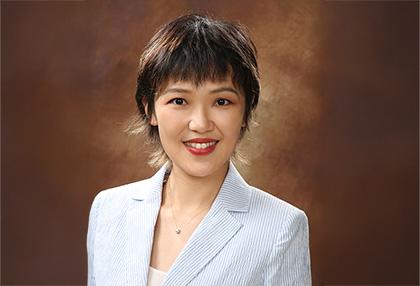
Yutian An, whose research lies at the intersection of criminal law, administrative law, and comparative law, is joining the UCLA School of Law faculty as an assistant professor.
She will come to UCLA Law in January 2026 from Harvard Law School, where she has been a Climenko Fellow and lecturer. She will defend her Ph.D. dissertation in politics at Princeton University in December.
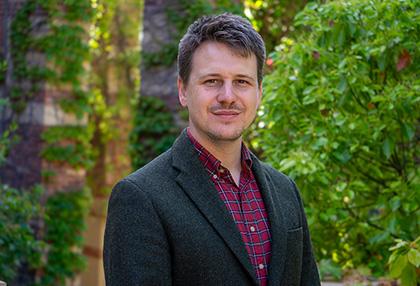
Brian Highsmith, whose research focuses on the design of local- and state-level democratic institutions in the United States, has joined the UCLA School of Law faculty as an assistant professor.